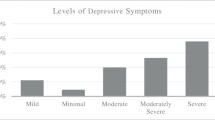Summary
The postpartum depression outcome and the effect of psychological intervention were studied in order to reduce the occurrence and development of the postpartum depression. A survey of 4000 women within 4–6 weeks postpartum in 80 communities in Shenzhen, China was performed using random cluster sampling method. By employing Edinburgh Postnatal Depression Scale (EPDS) as a screening tool, the positive women (defined as EPDS ≥10) were randomly divided into intervention group and control group at a ratio of 1:2. The women in the intervention group were treated by means of mailing postpartum depression prevention and treatment knowledge manual, face-to-face counseling, and telephone psychological counseling interventions aiming at individual risk factors, while those in the control group were treated with conventional methods. EPDS scores were assessed in these two groups again at 6th month postpartum. Totally, 3907 valid questionnaires were obtained. All the 771 positive women were divided into two groups: 257 in the intervention group, and 514 in the control group. At 6th month postpartum, the EPDS scores in the intervention group were decreased significantly, from baseline stage (12.84±3.02) to end stage (3.05±2.93), while EPDS scores in the control group were reduced from 12.44±2.78 to 6.94±4.02. There were significant differences in the EPDS scores at end stage between the two groups (t=13.059, P<0.001). Psychological intervention can reduce postpartum depression, with better maternal compliance. It is feasible and necessary to establish postpartum depression screening and psychological intervention model in community-hospital and include the postpartum depression screening, intervention, and follow-up into the conventional healthcare.
Similar content being viewed by others
References
Affonso DD, De AK, Horowitz JA, et al. An international study exploring levels of postpartum depressive symptomatology. J Psychosom Res, 2000, 49(3):207–216
Horowitz JA, Goodman J. A longitudinal study of maternal postpartum depressive symptoms. Res Theory Nurs Pract, 2004, 18(2–3):149–163
Milgrom J, Negri LM, Gemmil AW, et al. A randomized controlled trial of psychological interventions for postnatal depression. Br J Clin Psychol, 2005, 44(4):529–542
Horowitz JA, Cousins A. Postpartum depression treatment rates for at-risk women. Nurs Res, 2006, 55(2):s23–27
Zhang XS, Zhao GL, Chen LJ, et al. Onset, prognosis and effect factors of postpartum depression. Zhongguo Fuyou Baojian (Chinese), 2009, 24(22):3062–3065
Zhang X, Xi W, Miao RJ. A follow-up study on recovery process of postpartum depression. Zhongguo Xinli Weisheng Zazhi (Chinese), 2002, 18(6):376–380
Alder E, Truman J. Counseling for postnatal depression in the voluntary sector. Psychol Psychother, 2002, 75(2): 207–220
Cooper PJ, Murray L, Wilson A, et al. Controlled trial of the short- and long-term effect of psychological treatment of post-partum depression. I. impact on maternal mood. Br J Psychiatry, 2003, 182:412–419
He SS, Fu YY. Effectivenes of informational support in reducing the severity of postal depression in Taiwan. J Adv Nurs, 2002, 42(1):30–36
Li XH, Xie ZY. Postpartum depression psychotherapy evaluation of general. J Hunan Normal Univ (Med Sci) (Chinese), 2010, 7(3):23
Qi GQ, Lu Q, Chen XY, et al. Effect of psychological intervention on the life quality of postpartum depression. Zhongguo Yufang Yixue Zazhi (Chinese), 2009, 10(6): 491–493
Ma YT, Ye XF, Chen J. Investigation on prevention and treatment of postpartum depression and community-based interventions. Zhonghua Quanke Yixue Zazhi (Chinese), 2009, 7:862–863
Alici-Evcimen Y, Sudak DM. Postpartum depression. Prim Care Update Ob/Gyns, 2003, 10(5):210–216
Appleby L, Warner R. A controlled study of fluoxetine and cognitive-behavioural counselling in the treatment of postnatal depression. BMJ, 1997, 314(6):932–936
O’Hara MW, Stuart S. Efficacy of interpersonal psychotherapy for postpartum depression. Arch Gen Psychiatry, 2000, 57(8):1039–1045
Dennis C. Treatment of postpartum depression, part 2: a critical review of nonbiological interventions. J Clin Psychiatry, 2004, 65(9):1252–1265
Yan J, He H, Yang QH. Community intervention measures and effect of postpartum depression in primiparous women. Zhongguo Fuyou Baojian (Chinese), 2010, 25(4): 442–445
Author information
Authors and Affiliations
Corresponding author
Additional information
This project was supported by the Foundation of Shenzhen Science and Technology Plan, China (No. 200903115).
Rights and permissions
About this article
Cite this article
Jiang, L., Wang, Zz., Qiu, Lr. et al. Psychological intervention for postpartum depression. J. Huazhong Univ. Sci. Technol. [Med. Sci.] 34, 437–442 (2014). https://doi.org/10.1007/s11596-014-1297-x
Received:
Revised:
Published:
Issue Date:
DOI: https://doi.org/10.1007/s11596-014-1297-x



